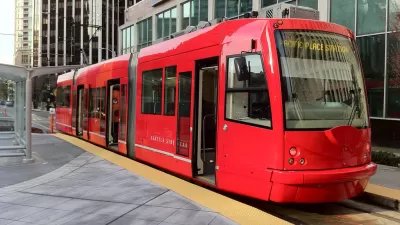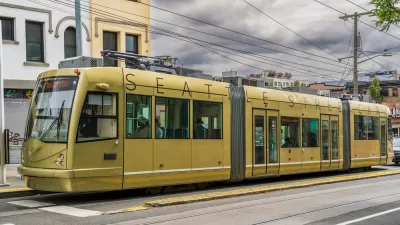The $1 million cut doesn’t bode well for the beleaguered project, which some city councilmembers see as redundant and overpriced.

Seattle’s proposed First Avenue streetcar line, known as the Center City Connector, more than a decade in the works, faces a new obstacle after a city council committee voted 3-2 to eliminate a $1 million earmark for a feasibility study for the project, reports David Kroman in The Seattle Times. “Some work on the study has already been completed within the Seattle Department of Transportation’s existing budget, Housen said, but the $1 million is needed to see it through.”
As Kroman notes, “the vote highlights the skepticism within City Hall of a project likely to cost over $300 million and take several years to complete.” A 2019 estimate put the projected cost at $285 million, almost double the original projection.
Kroman adds, “The city’s latest capital budget identifies sources for $144 million of the car’s estimated $237 million cost, not including utility work. About $77 million of that amount comes from federal funding that is not currently in hand.” City Councilmember Alex Pedersen, who opposes the project, says the Connector project “is expensive, redundant, disruptive and less important than many other transportation projects we have, especially transportation safety projects.”
FULL STORY: Plans for long-delayed Seattle streetcar line hit City Hall snag

Maui's Vacation Rental Debate Turns Ugly
Verbal attacks, misinformation campaigns and fistfights plague a high-stakes debate to convert thousands of vacation rentals into long-term housing.

Planetizen Federal Action Tracker
A weekly monitor of how Trump’s orders and actions are impacting planners and planning in America.

San Francisco Suspends Traffic Calming Amidst Record Deaths
Citing “a challenging fiscal landscape,” the city will cease the program on the heels of 42 traffic deaths, including 24 pedestrians.

Defunct Pittsburgh Power Plant to Become Residential Tower
A decommissioned steam heat plant will be redeveloped into almost 100 affordable housing units.

Trump Prompts Restructuring of Transportation Research Board in “Unprecedented Overreach”
The TRB has eliminated more than half of its committees including those focused on climate, equity, and cities.

Amtrak Rolls Out New Orleans to Alabama “Mardi Gras” Train
The new service will operate morning and evening departures between Mobile and New Orleans.
Urban Design for Planners 1: Software Tools
This six-course series explores essential urban design concepts using open source software and equips planners with the tools they need to participate fully in the urban design process.
Planning for Universal Design
Learn the tools for implementing Universal Design in planning regulations.
Heyer Gruel & Associates PA
JM Goldson LLC
Custer County Colorado
City of Camden Redevelopment Agency
City of Astoria
Transportation Research & Education Center (TREC) at Portland State University
Jefferson Parish Government
Camden Redevelopment Agency
City of Claremont





























